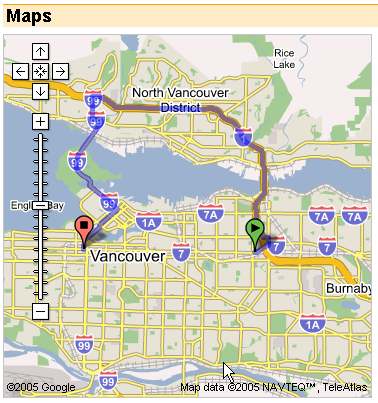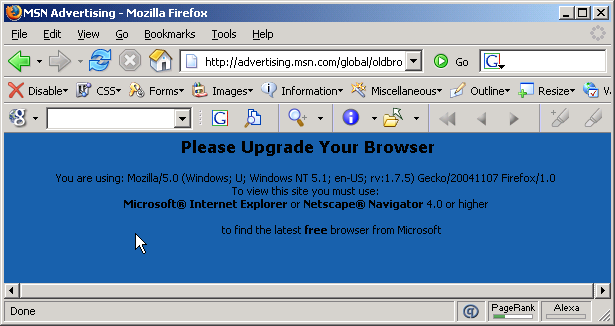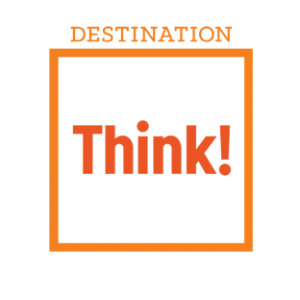February 2005
The Archives
-
Uncategorized
RSS Rant
No RSS? No downloads? No interaction? Fake content? You’re fired!
Will techies and marketing folks ever get along?Update 3/3: MSN found site in question and Sean Carver from the Microsoft search team is defending it on the MSN search blog. The comments are nasty. I frown upon the strategy but the real success can only be measured among it’s target audience.
-
Travel & Tourism
Navigation Limit
I’ve seen my share of technology restrictions on online booking systems, in particularly ours. But this one I found on the aircanada website was new to me:
Sorry but we cannot process your request as you have hit the navigation buttons (forward and Back) too many times. Please start again.So now I’m wondering what the limit is. At least the error message is clear.
-
Uncategorized
Gmail
I signed up for a notification shortly after Gmail launched about a year ago. Today I received an invite from Google to open a Gmail account. I got an invite shortly after Gmail launched so I’ve been using it for a while now and although I’m not using it as my primary email account (yet), I love the functionality. I basically use it as online storage. But this is another indicator Google might be close to rolling out Gmail to the world.
If you are one of the few that doesn’t have a Gmail account yet, drop me an email at william at williamsweekly dot com and I’ll send you an invitation, I have 50 left I think.
-
Uncategorized
Microsoft plans IE7 release for this summer.
Microsoft will finally release a new Internet Explorer browser this summer. Originally, the browser was to be introduced with the new longhorn operating system but Microsoft changed their plans. Firefox certainly played a key role in this decision. This is great news because web authors and developers have complained for a long time about the current IE’s lack of support for web standards and it’s security issues.
Related:
- Asa Dotzler from the Mozilla foundation has few good observations
- C|Net sums the news up nicely
-
Internet
Google Driving Directions

Here’s what Google suggest as driving directions for a 17 block trip on the same street here in Vancouver, BC. Instead of just going straight down the road for 5km (an 8 minute drive), Google suggests to take the scenic tour and go through the downtown core, through the park, over the bridge to the Trans-Canada highway, back over another bridge and to the same street again. A trip that, depending on the time of day, can vary from 30 mins to 2 hours.
Computer generated driving directions are great when you travel far (although there are exceptions), but not so great for smaller distances. It’s too highway focused.
UPDATE: I receive a lot of traffic (from Google) to this old post so here’s the latest. Google’s algorithm has improved and the issue has gone. But Google has a great sense of humour. See how Google suggests how you cross the Atlantic when traveling from Amsterdam to New York

-
Uncategorized
Google Maps
Just found out Google maps launched. First impressions:
- Objective, no clutter interface (+++)
- Maps themselves look very good (+)
- Maps are draggable (+++)
- Maps load very fast (+++)
- Directions are good (+)
- Local Search results are incomplete; 10 results only (—)
- Little bubbles for local searches are very efficient (+)
-
Uncategorized
The Register: Why Napster will be a fully-integrated flop
The Register has an article about the new Napster-To-Go subscription service I wrote about in my last post. The basic argument is that someone could spent the subscription fee for years and end up with nothing, or buy albums and end up with his own library.
I’m not saying Napster-To-Go will succeed, but the idea behind it will in one format or the other. The basic argument is wrong. The author might also still have a barrel of water in her kitchen still (see my last post) because it assumes the need for ownership of the music files. Why would you want to own anything if one can have access to millions of songs instead? Think of the possibilities of access to any song, all the time. How many times have you bought an album and stopped listening to it after a month? Out of 1000 CD’s I own, I probably only listen to 25 or so on a regular basis. You wouldn’t have to worry about it anymore. By analyzing the songs you access and listen to, other artists can be recommended to you. You can sample new artists constantly, for free. Artists can make every concert available. You could listen to a different concert from your favorite artist every day. The possibilities are endless.
Update: Glad I’m not the only one who dissagrees
-
Uncategorized
Napster Subscription Service
Lot’s of buzz about the Napster To-Go subscription service. Unlimited access to their catalog for $15/month.
Never mind that people love their Ipods, and never mind about digital rights management technology. What really matters is the way users of music are or aren’t going to store their data. Is it going to be purchase->store such as iTunes or subscription based such as Napster? The best analogy I’ve heard about the subject is one about the way people used to store water before running water existed. I wish I knew where I’ve heard because I’d love to give the person credit.
Before running water, people used to pump water, get it from a river or some other source. They would then store this water in a barrel in their kitchen. When running water became available, the generation who was used to storing water would simply fill their barrel with water from their faucet. The next generation accepted there was no need for water storage in barrels.
Is the same happening to music? Our generation is very used to getting music from a source (a CD shop) and storing it (in huge CD racks). When music became available online, people started downloading and burning. I have friends with 100’s and 100’s of burned CD’s, and now also DVD’s. Now more and more people are storing all this music on their hard drives. Why bother burning it? So will the next step be ‘why bother storing?’. Napsters formula made me think. $15/month for access to whatever I want to hear at any time, or $1/song, or the trouble of finding it on a P2P network that I might only listen to for a while? I don’t need a barrel in my kitchen, the $15/month option is starting to sound pretty good.
-
Uncategorized
New Tourism Websites – Feb 6, 2005
Ontario town and country offers getaway packages and ideas.
Interesting website, (hopefully) aimed to promote short haul getaways. I’d say it does the job reasonably well.VisitScotland has an ancestral website in which people with a Scottish background can trace their family tree.
Great way to attract tourists with Scottisch roots.I was so exited to hear aboutwww.visitsouthasia.org, a website to promote “Nature, Culture, Adventure” and “Buddhist Heartland”
Unfortunately, it’s a brochure dumped in a Flash website, literally.www.phuket-photos.com: pictures of the Tsunami devastation and recovery
Help Phuket recover faster by showing how nice is our island TODAY. -
Uncategorized
Please downgrade your browser
The MSN homepage received an interesting makeover with the launch of the new MSN search. It’s a big step toward Web Standards. Not that the homepage validates or anything but it’s a step in the right direction.
My enthusiasm was quickly tempered when I pointed my Firefox browser towards the Advertising Link on the search results screen. A good old “Please Upgrade Your Browser” message appeared. So in order for me to spend my advertising dollars with MSN, I need to meet a technology requirement. That would be like Shell only accepting Fords in their gas stations. It’s ridiculous.
At least call it “Please downgrade your browser” because the suggested browsers aren’t exactly an upgrade.


